By Lucy Komisar
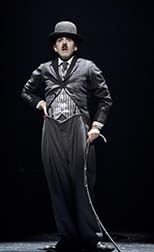
Charlie Chaplin wasn‘t just an actor. He created the characters he portrayed and wrote and directed the films he starred in. There hasn‘t been anyone like him since. But his art, his life, and above all his ideas were dangerous to the political system. The opening of “Chaplin” shows him on a tightrope, and he was heading for a fall.
Based on a book by Christopher Curtis and Thomas Meehan and with music and lyrics by Curtis, this is the best, most powerful, most intelligent new musical of the season. It‘s a worthy tribute to Chaplin the man, inventive and often thrilling.
The creativity of the writers and director-choreographer Warren Carlyle rivals only Chaplin‘s own. His past is portrayed in black and white, the shades and shadows of a film of his life. Chaplin racing on a turntable recalls the flickers of an early film.
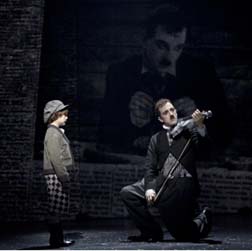
The central conceit tracks the way Chaplin‘s art followed his mother‘s advice to look inside people, their stories, their hearts. She said, “Then you can play your part.” The genius of this musical is to show a backdrop screen with a Chaplin film that echoes the biographical events that occur on the stage.
The iconic film “The Kid” is shown when the play depicts the childhood of Chaplin, the poor London youth with a father who deserted and a mother who was a music hall performer and then left him alone and destitute when she was hospitalized. We see the kid on the screen being taken from his mother in a scene shown repeatedly as a backdrop to Chaplin‘s life. There‘s a direct line to him picking up the long shoes and bowler hat that represented the character of The Tramp.
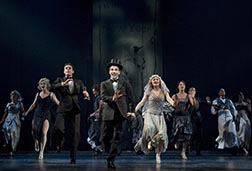
Rob McClure is superb and dynamic as Chaplin, both in a dramatic role and as a musical performer. His face and demeanor and his quirky smile conjure up the master. He has a good Broadway voice, though it sometimes is not melodic enough and suffers from Broadway over-miking. (Zachary Unger is a cute young Chaplin who also plays the child actor Jackie Coogan.)
We see the development of “The Gold Rush” and “Modern Times.” There is dazzling staging and choreography of the Hollywood years, jazzy songs and dancing. The sets by Beowulf Boritt and costumes by Amy Clark and Martin Pakledinaz are smart and evocative.
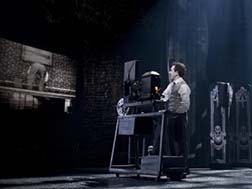
Chaplin set up his own studio. Perhaps looking for the love he missed as a child, or as part of the Hollywood casting couch, Chaplin had a lot of women, many of whom (according to the play) threw themselves at him. They included the actress Paulette Goddard. Hollywood is shown as a circus with hoops and dancing girls with cash bags. His ex-wives got big settlements.
But politics was more dangerous than dalliances. With the rise of Hitler, the mass war deaths in Russia, and the U.S. staying out, Chaplin gave speeches calling for entry into the war. He made “The Great Dictator” in 1940. The joke is that a Jewish barber is mistaken for Hitler and makes a speech about peace. Using real video of Hitler at a rally, he imitates his gestures, then turns off the sound and adds text to say, “I‘m a little teapot.” Biting satire for the time. And apparently premature anti-fascism. It would take the U.S. entry into the war for the studios to churn out the anti-German pro-U.S. military movies of the forties. It’s all about timing.
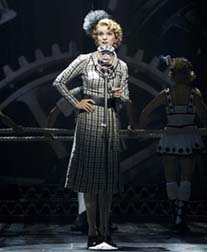
Meanwhile, the politics of anti-communism would bring Chaplin down. The vicious Hedda Hopper (a taut, tart Jenn Colella), angry because he wouldn‘t go on her radio show, decides to slander him as a communist. She is pro-German, tapes him at rallies, and collaborates with U.S. Attorney General McGranery (Michael McCormick) to target him for politically incorrect speech. She also manages to promote a paternity suit by a putative lover. “What you gonna do when it all falls down” is a jazzy, brilliant number.
Chaplin left the U.S. for Switzerland in 1952, sleazy FBI Director Herbert Hoover got the Immigration and Naturalization Service to revoke his re-entry permit, and Chaplin returned only twenty years later in 1972 to receive an honorary Academy Award and a glittering audience ovation. It was just a month before Hoover died. By then, even in Hollywood everyone knew that fascism was bad and that Chaplin’s detractors had been evil.
This is a memorable theater experience.
“Chaplin.” Book by Christopher Curtis and Thomas Meehan; music and lyrics by Christopher Curtis; directed and choreographed by Warren Carlyle. Ethel Barrymore Theatre, 243 West 47th Street, New York City. 212-239-6200. Opened Sept 10, 2012. Closes Jan 6, 2013. 12/22/12.


No Ms Komisar.. Chaplin was NOT Jewish. You obviously aassumed because he made political speeches defending the underdog, that he was a Jew. How come no proofreader or editor caught this innacuracy. Not a Jewish bone in his body and not that it matters, BUT get your information straight!!!!